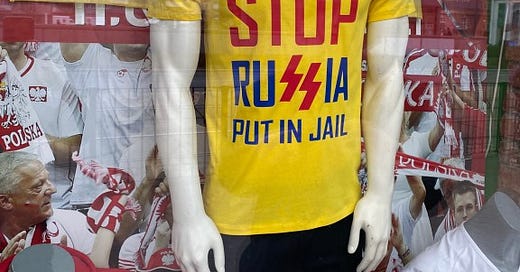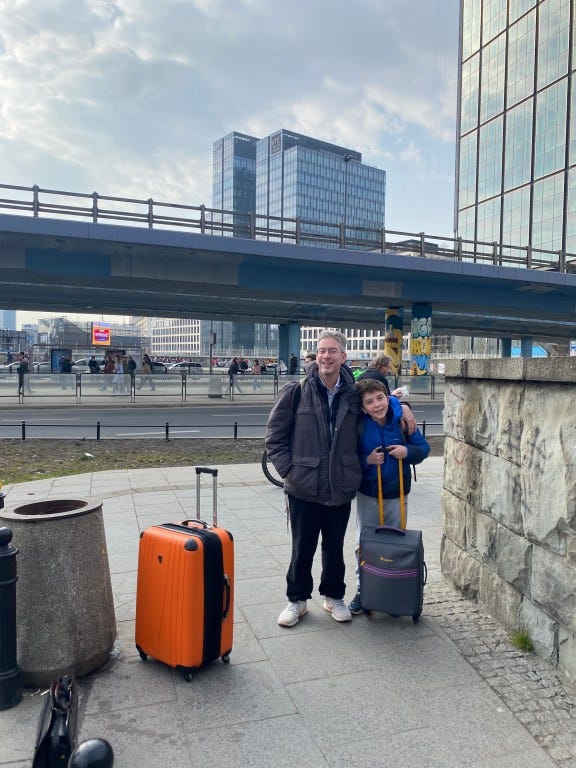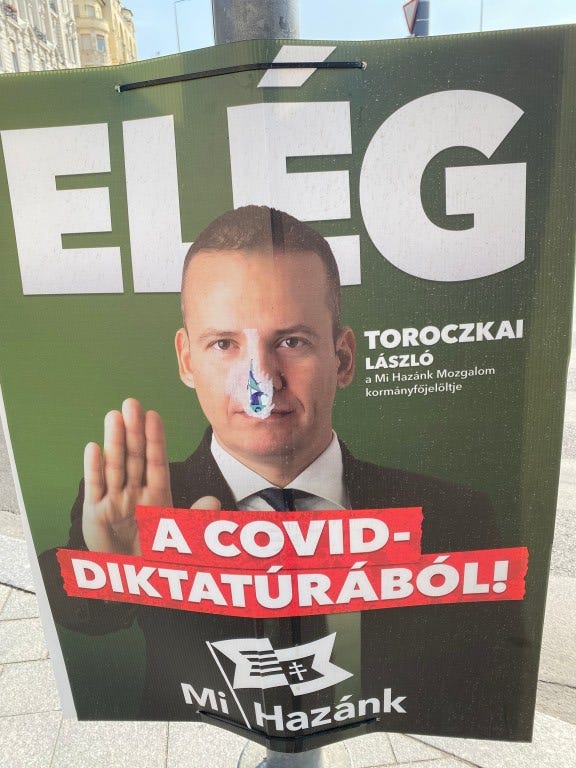1. Poland was the most anti-Russian country I visited. By a wide margin. If this seems "natural," remember that it was in Hungary (1956) and Czechoslovakia (1968) that Soviet tanks last invaded. Polish martial law of the 1980s was home-grown, albeit with Soviet threats in the background. With enough mental gymnastics, the Poles could easily blame World War II on the Germans alone... but they don't. There is probably no other country on Earth with a better grasp of the fact that World War II began with an alliance between Nazi Germany and the Soviet Union to conquer all the countries that lay between them.
2. Visiting Warsaw was like visiting the future - Coruscant on the Vistula. While the Poles rebuilt the historic old-town after World War II, the city is packed with modern skyscrapers - including Varso, the tallest building in the EU. All of the other cities I visited were, quite frankly, stunted. From what locals told me, every city I visited except Warsaw continues to stubbornly strangle the construction industry in the name of historic preservation. Budapest is the most draconian NIMBYville of all; the city's tallest building, when finished, will be only thirty stories high.
3. In all three Polish cities I visited, affiliates of the Instytut Misesa expressed dismay at what they see as the pro-Putin stand of the American Ludwig von Mises Institute. “Why are they repeating Putin’s propaganda?,” they demanded.
I told the Poles they shouldn’t be surprised. While an isolationist or pacifist can retain reasonable views about which countries are most to blame for a conflict, it is psychologically easier to apologize for the side your country would be fighting if it fought. Rothbard habitually did this, even cheering the fall of the Saigon. The infamous opening words of his 1975 editorial:
What has been happening so swiftly in Indochina can only be exhilarating to any libertarian: for what we have been seeing before our very eyes is nothing less than the death of a State — or rather two states, the Saigon regime in South Vietnam, and the Phnom Penh regime in Cambodia.
Rothbard’s followers internalized this bizarre attitude, and continue it to this day. Which doesn’t mean that they’re wrong to think the Ukraine-Russia War could have been avoided with Ukrainian concessions. My point is that Rothbardians have a terrible track record of identifying the lesser of two evils, even when the gap in their evil is vast.
4. Covid caution was effectively over in every country I visited. Virtually no one masked outdoors. At my indoor events, masking averaged about 15%. Airports and airlines nominally kept their mask mandates, but enforcement was feather-light. My Lufthansa flight from Frankfurt to Krakow aside, flight attendants looked the other way when passengers ignored the mask rules. The last hold-out for masking mania: Hotel breakfast buffets, which still aggressively demand compliance. Apparently buffets are the last Covid hot spots in the region...
5. The only opposition party with an engaging election campaign was Mi Hazank, which plastered Budapest with signs denouncing the "Covid dictatorship." Given the near-absence of Covid rules, this was peculiar to say the least. Still, it was the only party blatantly denouncing "dictatorship," which you'd think would be the focal issue of 2022. My Hungarian friends assured me that Toroczkai was part of the "fake opposition" - one of several parties cynically funded by Orban to split the opposition.
6. My favorite movement in Hungary, I must confess, was the Two-Tailed Dog Party. Founded in 2006, this joke party's absurdist logo was all over Budapest. And they're funny, spitting squarely in the face of Social Desirability Bias:
On 20 June 2009, the [Two-Tailed Dog Party] held a "general" protest with approximately three hundred participants in front of the Hungarian Central Statistical Office to demand "Tomorrow should be yesterday!", "Look stupid!" and "Disband!" etc., with a chant of "What do we want? Nothing! When do we want it? Never!"
In 2010, the party announced their candidacy for mayor of Budapest with the main slogan "Let everything be better!". Campaign slogans include "More everything, less nothing!", "Eternal life, free beer, tax-deduction!" and "We promise anything!"
7. Americans and Poles ominously warned me that Hungarian was incomprehensible, sui generis. To be honest, Polish, Czech, and Slovak were equally alien for me. Near-zero cognates for everyday words - and a struggle to pronounce almost every syllable. Spending time in the Slavic world you readily see how English, German, Dutch, Danish, Norwegian, and Swedish are all part of a common Germanic language family. Yes, these tongues vary more than the Romance languages do from each other, but the Slavic family is shockingly linguistically remote given its geographical proximity.
8. Twenty five years ago, German was still widely spoken in Eastern Europe. Back in 1997, I found my two years of college German useful even in Ukraine. Yet despite Germany's central location and paramount position in the EU, knowledge of German in Eastern Europe has fallen to near-zero. Stepping back, today is probably the lowest point for the German language in this region in the last five hundred years. Maybe even a thousand years depending on how you classify earlier dialects. English, as expected, picks up the slack - except in Hungary, where the average person seems fully monolingual - even in Budapest.
Subscribe to Bet On It
Caplan and Candor











> Rothbardians have a terrible track record of identifying the lesser of two evils, even when the gap in their evil is vast
I think many Rothbardians are arguing that the gap in evil is about the same or worse for the Ukraine: Supposedly, the U.S. spent $5 billion to foment the 2014 coup d'état (in which the U.S.'s Victoria Nuland was caught on audio pushing who should be the new leader, and that person ended up being the leader), which then led to an attempt by the Donbas to rebel and that led to tens of thousands of deaths (according to the U.N.) through the evil of bombardment by the Ukrainian state over 8 years. I haven't seen casualty numbers for the Russia/Ukraine war higher than that yet.
Most Rothbardians I've heard argue about this are primarily anti-U.S. imperialism and anti-Ukrainian suppression of Donbas/Crimea. They're also anti-Putin but they're just arguing that it's strange to have a one-side view on the conflict.
By analogy, the view I've heard of most can be analogized to Osama bin Laden: Harry Browne and Ron Paul weren't pro-bin Laden, nor were they not anti-bin Laden; they were just simply pointing out that U.S. imperialism is a primary driving force of the evil of bin Laden, and, arguably, the evils of U.S. imperialism are larger, in total.
Great analysis!